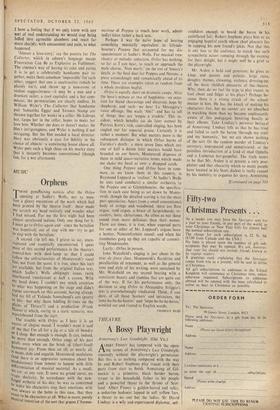MUS I C
Orpheus
rr HOSE genuflecting notices after the Orfeo I opening at Sadler's Wells, not to men- tion a glossy encomium of the work which had been printed by the• theatre itself : these made me scratch my head restively and wonder what I had missed. For me the first night had been almost unrelieved tedium. Only one thing for it. I must go to Orfeo again and—since the battalion Was hopelessly out of step with me—try to get in step with the battalion' A second trip left me, I grieve to say, unen- raptured and essentially unconverted. I spent Most of this second performance in the theatre's control-box with desk-lamp so that I could follow the anfractuosities of Monteverdi's vocal line, not from the score, it is true, since this isn't Yet available, but from the original Italian text, which Sadler's Wells obligingly issues (with interleaved translation) at half a crown. With nlY head down, I couldn't pay much attention to what was happening on the stage and didn't repine overmuch on this account, having already had my fill of Yolanda Sonnabend's sets (pretty in bits—but why those fiddling fir-trees on the
Plains of Thrace?) and a production (Frank Hauser's) which, owing to a static scenario, was musclebound from the start.
The trouble with Orfeo as I hear it is an excess of elegiac mood. l wouldn't want it said of me that I'm all for a jig or a tale of bawdry or I sleep. But enough is enough. It can, indeed, be more than enough. Orfeo sings of his past
griefs even when on the brink of (short-lived) n.Ymeneal joy. From then on all, or nearly all, Is mope, dole and anguish. Monteverdi modulates (and there is an oppressive sameness about his modulations) from lament to lament with little stlifferentiation of musical material. As a result, we (or
, at any rate, I) sense no grand curve, no
,Lragic declivity. In accordance with the new- oujid :esthetic of his day, he was so concerned it o make his characters sing their emotions, with woe always at the helm in this case, that they !ease to be characters at all. What is more, purely Inosical invention of the sort that graces L'Incoro-
nazione di Poppea (a much later work, admit- tedly) takes rather a back seat.
Perhaps it was the naive hope of hearing something musically equivalent to Glynde- bourne's Poppea that accounted for my dis- appointment at Sadler's Wells. For musical tren- chancy or melodic seduction, Orfeo has nothing, so far as I can hear, to touch or approach the male chorus, 'Non morir,' on the eve of Seneca's death, or the final duet for Poppea and Nerone, a piece astonishingly and romantically ahead of its time. These are examples taken at random from a whole invidious bagful.
Or/e° is equally short on dramatic coups. After the hero's minute or two of happiness—an occa- sion for bland chorusings and decorous hops by shepherds and such--we hear La Messagera's voice offstage. She wails 'Ahi!' and has to tell of things that are 'empio e crudele.' This in- cident, which behefits (as do later scenes) by Patricia Kern's rich, controlled singing, has been singled out' for especial praise. Certainly it is rather a moment. But what matters more is the subsequent dialogue in which Orfeo learns of Euridice's death: a mere seven lines which any one of half a dozen later masters would have branded on our hearts. Monteverdi disposes of them in mild quasi-recitativo terms which made me shake ,my head as over a dropped catch.
One thing Poppea and Or/e° have in com- mon, as we know them in this country, is Raymond Leppard as 'realiser.' At Sadler's Wells he uses (and conducts) a similar orchestra to the Poppea one at Glyndebourne, the specifica- tion in each case being as set down by Monte- verdi, though the detailed scoring is for the most part speculative. Apart from a small conventional, body of strings and woodwind, there are flute organ, reed organ, a brace of harpsichords, re- corders, lutes, chitarrones. As often as not these sound even more delicious than their names. There arc times, it is true, when exposed parts for one or other of Mr. Leppard's organs have a hoMey, Nonconformist sound; and when his trombones gang up they are capable of commit- ting Mendelssohn.
Lastly: Orfeo in person.
John Wakefield's singing is just about in the tour de force class. Monteverdi's floridities and peculiarities of ornament, as well as the general tone and style of his writing, were sustained by Mr. Wakefield on my second hearing with a consistent beauty and stamina that are quite out of the way. If for his performance only, the decision to sing Orfeo in Alessandro Striggio's text is overwhelmingly vindicated. Think, if you dare, of all those 'hockets' and intrusives, the 'ama-ha-ha-ha-hantes' and 'impe-he-he-he-heros,' winkled out and riveted to English words.
CHARLES REID






























 Previous page
Previous page